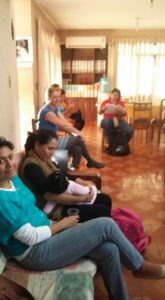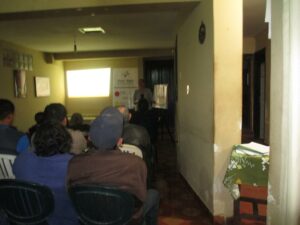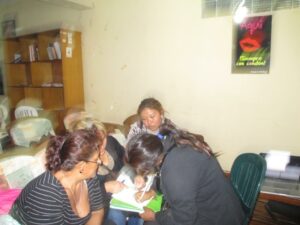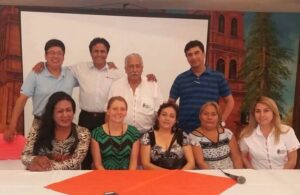Engaged Anthropology Grant: Carina Heckert

Carina Heckert is an Assistant Professor of Anthropology at the University of Texas at El Paso. In 2013 she received a Dissertation Fieldwork Grant to aid research on “Gender Relations, Illness Experiences, and HIV/AIDS Care in Santa Cruz, Bolivia,” supervised by Dr. Nia Parson. In 2015 she received an Engaged Anthropology Grant to aid engaged activities on “Improving Experiences of Care for People Living with HIV/AIDS in Santa Cruz, Bolivia”.
From 2013-2014, while a Ph.D. candidate at Southern Methodist University, I conducted fieldwork supported by the Wenner-Gren Foundation for the project “Gender Relations, Illness Experiences, and HIV Care in Santa Cruz, Bolivia.” In the summer of 2016, a Wenner-Gren Engaged Anthropology Grant gave me the opportunity to return to Bolivia for one month to host a workshop series titled “Improving the Quality of Life for People Living with HIV.” This series included activities with public health officials, people living with HIV, and representatives from civil society organizations. The workshops involved a presentation of my research findings alongside room for debate and discussion about how to improve experiences of care for people with HIV. The series culminated in a roundtable forum that brought together various local stakeholders as a means to foster dialogue among these different groups.
My dissertation fieldwork explored the ways that global health, national, and local policies intersect to shape the context of care for HIV and how individuals experience various forms of care. As I began my research, an AIDS funding crisis began to emerge as the Global Fund to Fight AIDS, Tuberculosis, and Malaria froze Bolivia’s active grants. The Global Fund had been funding nearly 80% of HIV-related activities at the time. The freezing of funds came after the Ministry of Health announced that they would takeover the management of Global Fund grants, which involved a violation of the terms of their grant agreement. The Ministry of Health’s actions were in part motivated by the national government’s agenda of moving away from vertical, disease-specific initiatives, which it sees as a vestige of the neoliberal era. Widespread shifts under the political party in power, MAS (Movimiento al Socialismo/Movement toward Socialism), include efforts to implement a single-payer universal healthcare model, viewing NGOs and international aid efforts as undermining this larger goal. Subsequently, actions on the part of the national government have resulted in a loss of funds from major donors that were financing HIV programs. However, the national and local governments are far from achieving a universal healthcare system and have yet to commit sufficient funding to the maintenance of HIV programs that had been financed by international organizations.

At the time of my research, there was substantial anxiety over the state of HIV care in Bolivia, especially among people living with HIV. Upon returning to Bolivia, I discovered that this anxiety, and the effects of it, had become significantly worse. While the Ministry of Health had been able to meet the requirements to have their grants from the Global Fund reinstated, their most recent grant agreement had come to an end. While the Country Coordinating Mechanism, an invention of the Global Fund that involves a group of local stakeholders, was in the process of developing grant proposals for the next funding cycle, there was little optimism and a general sense that Bolivia would receive insufficient funding to continue with the level of support for HIV programs that had existed in the past. Further, as the Country Coordinating Mechanism awaits a decision, there is no money flowing in from the Global Fund.
When I returned to Bolivia during this halt in Global Fund support alongside the loss of funds from other international financers, organizations that I had worked with in the past were in a state of disarray. The most well known HIV-related NGO in Bolivia had gone from a staff of roughly 10 to operating with a staff of two people, who were doing a majority of their work without pay. To continue operating weekly support group sessions, they had resorted to holding weekly raffles where support group participants all purchased raffle tickets upon their arrival. The Ministry of Health HIV clinic continued to have a steady stock of first-line ARVs that are now being purchased by the national government, but several staff positions have been terminated, second and third-line ARVs are no longer available, and the provision of care for opportunistic infections has been dramatically reduced. Within this context, there was substantial interest in my workshop series. Some people saw potential to use my research findings in grant proposals and as a way to support their demands for a more comprehensive response to HIV from the national and regional governments.

I tailored the first workshop toward the concerns of civil society organizations, many of which are struggling to keep their doors open and have had to significantly scale back their programs due to insufficient funding. Within this group of 10 participants, there was significant interest in discussing how my research could be applied to improve services that still exist and how my data could be used for the justification of reinstating programs that had been cut. The second workshop, geared toward people living with HIV, had 25 participants. In this workshop, I only dedicated a short amount of time to presenting my research, since much of what I had to say was intuitive to this group, whose experiences I had learned so much from. Instead, I used a majority of the time during this workshop to conduct a group work activity aimed at generating points for debate for the upcoming roundtable forum. I had initially planned to also hold a third workshop for public health officials, but this turned out to be far more complicated than I had anticipated. A formal invitation is necessary for employees in the public health system to receive authorization to participate in such events during work hours. I had anticipated this and had put together formal invitations to distribute. However, as I began to speak with public health officials about my plans, I realized that many viewed a workshop and a roundtable on the same issue as duplicate events and would only commit to one of the two events. Since I viewed the roundtable as the more important of the two events, I dropped plans for a third workshop to ensure participation from public health officials in the roundtable. In lieu of the third workshop, I had several small group and one-on-one meetings with the public health officials who were eager to discuss my research with me.
At the end of my month in Santa Cruz, I hosted a roundtable forum where I served as the moderator for a panel consisting of people living with HIV, the director of the regional HIV program, and representatives from civil society organizations. While the event was open to the public, primarily public health officials and representatives from civil society organizations were in the audience. Unfortunately, to accommodate the schedules of these audience members, I had to have the roundtable in the morning when fewer people with HIV could attend due to work conflicts. However, I was able to use the ideas generated in the activity from the second workshop as a way of bringing in the perspectives of people with HIV. The roundtable discussion focused heavily on how different parties could contribute to improving the quality of life of people living with HIV in Bolivia in the midst of cuts to programs. The aspect of the roundtable that I found most important was the opportunity for panel members with HIV to share their perspectives with public health officials who are very often disconnected from the everyday realities of people with HIV.

I found that this workshop series was an effective means for sharing the results from my research in a meaningful way. Further, the roundtable brought together different groups who have a common interest in improving the lives of people with HIV, but who have different perspectives in how to achieve this. I do have to admit that organizing the workshops turned out to be much more work than I had anticipated. Just the delivery of invitations to the roundtable took days of bus rides across the city. While I could have delegated this task to a research assistant, I decided this was a good way to touch base with people I had established relationships with during fieldwork. In many cases, the delivery of an invitation turned into a lengthy conversation. In one case, it turned into a several hours long event that involved me accompanying a doctor on rounds to check on patients in the hospital.
While I feel like my efforts had some positive effects, I also cannot help but feel impotent to some extent as the broader structural issues that perpetuate AIDS deaths in Bolivia remain unchanged. However, being an engaged anthropologist requires a best effort to make research accessible and relevant, even if it is an imperfect endeavor.